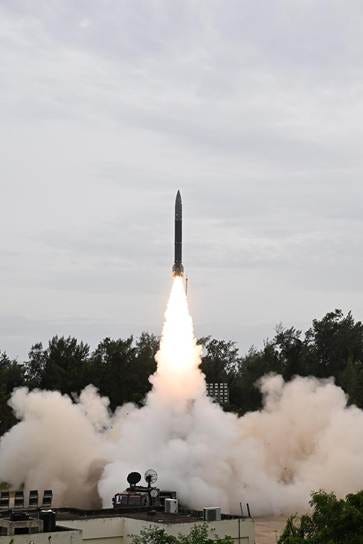DRDO successfully tests Pralay indigenous quasi-ballistic missile
Defence Research & Development Organisation (DRDO), India’s top defense R&D agency, conducted two consecutive successful flight tests of the Pralay missile off Odisha’s coast, according to a government press release. The solid-propellant, quasi-ballistic missile — developed by multiple DRDO labs and industry partners — demonstrated precise targeting and robust system performance. The trials validate the missile’s range capabilities and pave the way for its induction into the Indian Armed Forces, enhancing India’s technological edge in missile systems.

India expands EV charging stations in Tier-2 cities under PM E-DRIVE
The Ministry of Heavy Industries, Government of India, reports that there are 4,625 electric vehicle (EV) charging stations are operational in Tier-2 cities as of April 2025. With a ₹2,000 crore allocation from the PM E-DRIVE Scheme, the government allows private entrepreneurs to install charging stations – no license needed – and offers policy incentives to accelerate infrastructure growth, reflecting a broader push towards electrification beyond India’s metros.
DPIIT and Ather Energy join forces to boost India’s EV manufacturing
India’s Department for Promotion of Industry and Internal Trade (DPIIT), under the Ministry of Commerce and Industry, has signed an MoU with Ather Energy Limited, one of India’s top electric vehicle makers, in Bengaluru. Under the Build in Bharat initiative, the partnership will provide mentorship, infrastructure support, and talent programs aimed at advancing India’s EV and clean mobility sector. The collaboration seeks to strengthen the startup ecosystem and drive the nation’s transition towards sustainable transportation.
Hyundai Motor India unveils hydrogen innovation hub with IIT Madras
Hyundai Motor India Limited has set up the Hyundai HTWO Innovation Centre in partnership with IIT Madras and the Government of Tamil Nadu. The Chennai-based 65,000 sq. ft. research hub aims to accelerate green hydrogen technology through advanced labs, digital twins, and pilot-scale testing for electrolyzers and fuel cells, according to a post on the IITM website. Hyundai pledged Rs. 100 crore to foster indigenous hydrogen innovation and workforce development, supporting India’s net-zero and energy independence goals.
Aeva, LG Innotek in $50 million lidar chip manufacturing pact
Aeva Technologies, a US-based developer of 4D lidar sensing systems in Mountain View, California, has struck a major chip manufacturing partnership with LG Innotek, the components subsidiary of Seoul-based LG Group, TechCrunch reports. LG Innotek will invest up to $50 million and manufacture Aeva’s Atlas Ultra 4D lidar sensor for automotive customers, with plans to expand into consumer electronics and industrial applications. The collaboration aims to accelerate production and adoption of silicon photonics-based FMCW lidar technology, which uniquely measures both distance and object velocity in real time.
Meta unveils wrist-based human-computer interface that uses hand gestures
Meta Platforms, parent company of Facebook and Instagram, has unveiled a breakthrough non-invasive wristband that translates hand gestures and subtle finger movements into digital commands. Using surface electromyography (sEMG) and AI trained on thousands of users, the device generalizes out-of-the-box, letting wearers control computers, type in the air, and interact with devices by intention alone. Focused on both mainstream and accessibility use—including for those with paralysis—the technology could be commercially available within a few years, marking a potential paradigm shift in human-computer interaction.
MIT unveils transmitter chip that boosts wireless device efficiency
Researchers at Massachusetts Institute of Technology (MIT), in the US, have unveiled a transmitter chip that significantly improves the energy efficiency and reliability of wireless communications, MIT News reports. Designed for integration into existing and next-generation devices, the chip uses an innovative modulation scheme and a GRAND-inspired decoding algorithm to reduce signal errors, extending battery life and range for connected devices. The breakthrough, presented at a major industry symposium, could expedite advances in 6G and Internet of Things applications.
Quantum researchers propose scalable path for photonic option
An international scientific team has proposed a scalable path for photonic quantum computing by leveraging semiconductor quantum dots, Quantum Insider reports. These nanostructures can generate high-purity, indistinguishable single photons on demand—essential for building large-scale, fault-tolerant quantum processors. The study emphasizes integration with current chip fabrication techniques and highlights potential breakthroughs in modular design and hybrid system networking, bringing practical, scalable quantum photonic computers closer to realization.
Australia’s launch vehicle Eris from Gilmour Space crashes on test
Gilmour Space Technologies, a launch vehicle and satellite manufacturer headquartered on Australia’s Gold Coast, saw its Eris rocket crash just 14 seconds after liftoff during its historic debut at the Bowen Orbital Spaceport in Queensland. The three-stage vehicle, carrying only a jar of Vegemite as payload, began sliding sideways shortly after launch and exploded near the pad. While no orbit was achieved, CEO Adam Gilmour called it a major milestone, as critical systems functioned and flight data was collected to inform future test flights.
The video below is courtesy the Aussienaut YouTube channel.
Unitree Robotics offers humanoid robot R1 at $5,900
Unitree Robotics, headquartered in Hangzhou, China, has unveiled the R1 humanoid robot at just $5,900 — significantly undercutting rivals to drive mass adoption, according to The Robot Report. The 1.2m-tall, 25kg robot features 26 joints, in-house components, and options for AI development. Despite advanced agility and development tools, full autonomy still requires additional work, reflecting both R1’s potential and the sector’s stage.
















Share this post